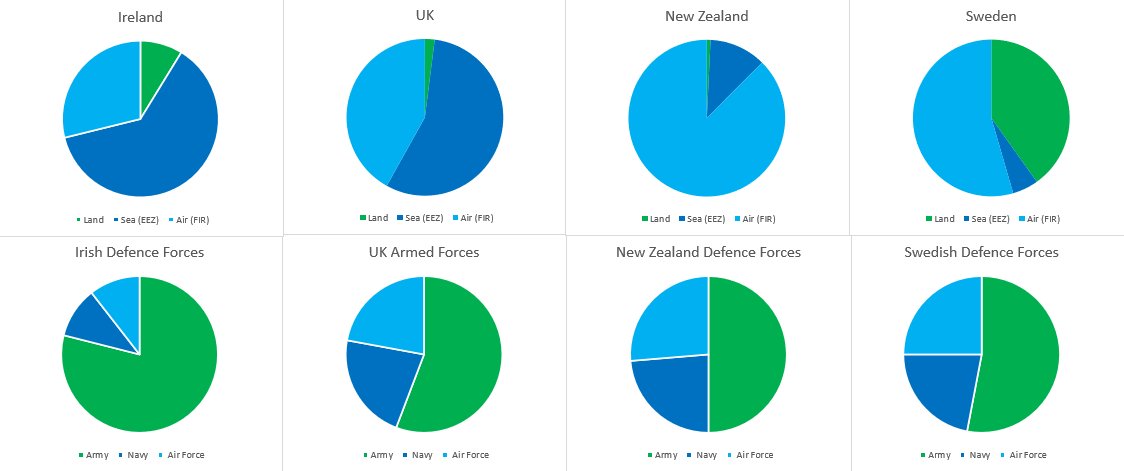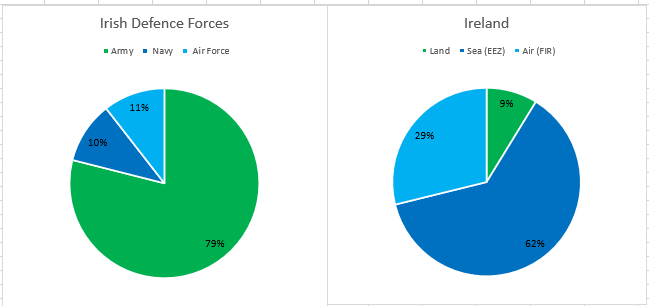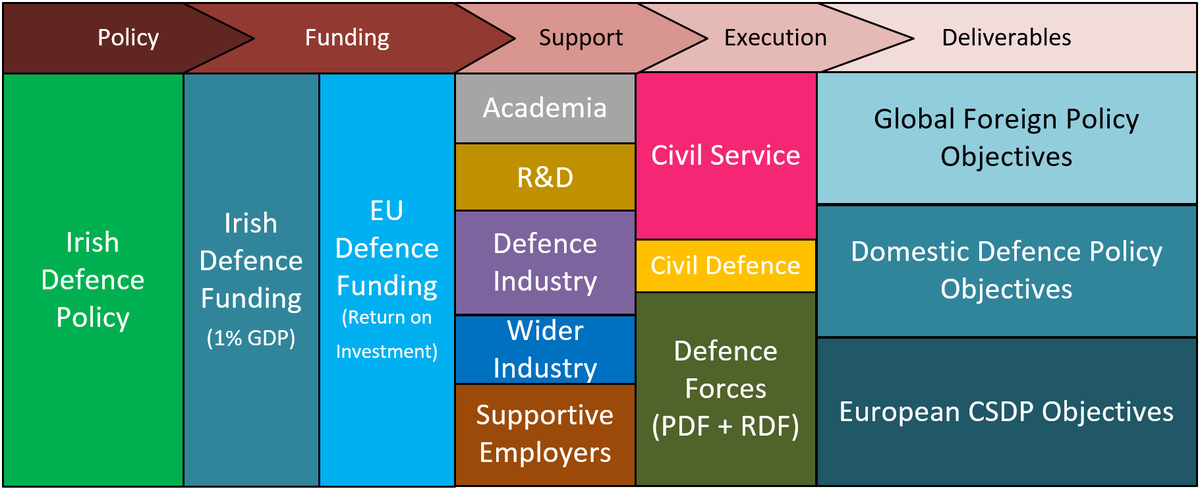
Thread:
"With regard to the RDF, the Commission will consider a wide range of options and will make recommendations to better leverage the capabilities of the RDF in their supports to the PDF and to make service in the RDF a more attractive option."
Let's unpack that.....
"With regard to the RDF, the Commission will consider a wide range of options and will make recommendations to better leverage the capabilities of the RDF in their supports to the PDF and to make service in the RDF a more attractive option."
Let's unpack that.....
https://twitter.com/IRLDeptDefence/status/1338834604397092864
Thankfully, the "Abolition of the Reserve" wasn't considered an option in the Terms of Reference as it was in the DoD's 2012 "Value for Money" Review of the RDF.
I would link the source, but the DoD have opted not to host it despite it informing the 2015 White Paper Policy.
I would link the source, but the DoD have opted not to host it despite it informing the 2015 White Paper Policy.

The 2012 Steering Committee comprised of Civil & Military (but not a single Reservist) personnel saw no role for the Reserve as the "PDF could meet all day-to-day tasks".
8 years on, & DF capability is limited due to a crippling retention crisis as a result of DoD mismanagement.



8 years on, & DF capability is limited due to a crippling retention crisis as a result of DoD mismanagement.




If the Commission are to "better leverage the capabilities" of the Reserve, while being "guided and informed by both the White Paper on Defence 2015 and the White Paper Update 2019", it will be a challenge as the policy that exists is simply not attractive enough to be scalable. 

The problem with this ToR is that the "joint force approach" doesn't include "civil". In the context of the RDF, that means there is little scope for the Commission to recommend an intermediary civilian civ/mil interface body that can engage employers, industry & education 

For a Reserve Force to be viable, it must guarantee the quality & availability of Reservists.
Employer engagement is a critical component to enable Reservist availability in conjunction with "legislative changes" that were mentioned in the press release.
Employer engagement is a critical component to enable Reservist availability in conjunction with "legislative changes" that were mentioned in the press release.
In addition to legislation & engagement, there will need to be employer support. That means tangibly supporting employers with an array of packages to compensate them for the inconvenience of sharing an employee.
Difficult when one must "regard the level of funding provided".
Difficult when one must "regard the level of funding provided".

Despite being a major stakeholder, there is no mention of Reservist employers in:
- 2012 VFM Review
- 2015 WP on Defence
- 2019 WP Update
- 2020 Com on DF ToR
"Employers" are mentioned in a WP Project that dovetails neatly with the civ/mil intermediary body mentioned above tho🤔
- 2012 VFM Review
- 2015 WP on Defence
- 2019 WP Update
- 2020 Com on DF ToR
"Employers" are mentioned in a WP Project that dovetails neatly with the civ/mil intermediary body mentioned above tho🤔

Why does all this matter?
Because by clearly omitting a review of the Civil side of the Defence Org, the Commission on the DF is restricted in what it can deliver within its own ToR.
Without Civil restructuring and support, RDF overseas isn't scaleable
Because by clearly omitting a review of the Civil side of the Defence Org, the Commission on the DF is restricted in what it can deliver within its own ToR.
Without Civil restructuring and support, RDF overseas isn't scaleable
https://twitter.com/RobGilbey/status/1330489119756210179?s=20
By not including the DoD in the ToR, but letting their recommendations from erroneous reviews not only stand, but guide the Commission's work means that the radical ambition for the Reserve that is required for it to meet 21st century challenges will go unfulfilled.
I'm not finished, but I am tired, maybe more tomorrow.
Continuing on...
Beyond employers, the Commission have to look at adequately remunerating the Reservists themselves.
Being guided by a policy of relying on Reservists to produce a sustainable specialist capability in a "voluntary unpaid capacity"* is laughable.
*WP Project 73
Beyond employers, the Commission have to look at adequately remunerating the Reservists themselves.
Being guided by a policy of relying on Reservists to produce a sustainable specialist capability in a "voluntary unpaid capacity"* is laughable.
*WP Project 73
Reserve Service should essentially be a Zero Hours contract with performance related bonuses.
All service should be paid.
Credentials should be recognised.
Professional standing should influence rank assignment.
The RDF is a means to go to market for talent we need right now.

All service should be paid.
Credentials should be recognised.
Professional standing should influence rank assignment.
The RDF is a means to go to market for talent we need right now.


But within the current Terms of Reference, this is difficult to recommend.
Take Technical Pay for example.
It is awarded to you if you have the required military specific training course completed and are serving in a role at a rank that qualifies for it.
Take Technical Pay for example.
It is awarded to you if you have the required military specific training course completed and are serving in a role at a rank that qualifies for it.
Now let's take cyber security.
Imagine being a Reservist who is a civilian expert in a particular field/platform/language not organic to the PDF & they want to contribute to the DF Cyber Incident Response Team.....
Imagine being a Reservist who is a civilian expert in a particular field/platform/language not organic to the PDF & they want to contribute to the DF Cyber Incident Response Team.....
1. They are paid up to ~19% less their lowest paid PDF counterpart.
2. They can't be paid for non-training activity
3. They can't be marked up for training (working) on something that isn't organic to the PDF.
4. Their highly marketable technical skills don't qualify for tech pay
2. They can't be paid for non-training activity
3. They can't be marked up for training (working) on something that isn't organic to the PDF.
4. Their highly marketable technical skills don't qualify for tech pay
Again, why does this matter?
Because the DoD Secretary General is the Accounting Officer for the DF not the Chief of Staff.
This means that even if it is universally agreed in the Defence Forces that Cyber Experts in the Reserve should be paid tech pay, they can't do it.
Because the DoD Secretary General is the Accounting Officer for the DF not the Chief of Staff.
This means that even if it is universally agreed in the Defence Forces that Cyber Experts in the Reserve should be paid tech pay, they can't do it.
Its not even worth going to the DoD with a business case, bc the rigidity of the regulations that govern pay would need to be changed & considering that the Reserve was reorganised in 2012 & the DoD still hasn't issued new Regs (R5) to reflect the change, why waste the effort?
If removing or at least restraining the DoD as a step actor from the decision making process for assigning funds and regulating pay isn't on the table, then I am struggling to fathom how we can expect a viable Reserve to be realised where organisational agility is key to success.
The ToR state that the Commission is to review "governance" and "command & control structures IN the Defence Forces".
If they're not able to consider recommending the Chief of Staff being the accounting officer for the DF, then they're rearranging the deck chairs on the Titanic.

If they're not able to consider recommending the Chief of Staff being the accounting officer for the DF, then they're rearranging the deck chairs on the Titanic.


Restructuring "in the Defence Forces" isn't the issue.
Restructuring in the Defence Organisation is.
Restructuring in the Defence Organisation is.
When I see the terms "agile", "flexible", & "adaptive" in the ToR, I can't help but think that the DoD are the antithesis of those terms & have cultivated a culture around the malicious obedience to process the prohibits the DF from reaching their full potential in those terms. 

This is why it is absolutely imperative and in very much in the national interest that a wholesale review of the DoD is immediately incorporated into the ToR, and that the "Commission on the Defence Forces" be renamed a "Commission on Defence" in it's entirety.
Without a Review of the DoD, not only do we stand to lose a once in a generation opportunity to save our national security infrastructure from its current downward trajectory, but not doing so could also cost us a generation of irreplaceable yet disillusioned military talent.
I don't want to be all doom and gloom.
I really want the Commission to succeed and bring about positive change, but this has to be the review that does it.
Command and control isn't the issue, budgetary control is.
Right now, that is not being addressed through the ToR.
I really want the Commission to succeed and bring about positive change, but this has to be the review that does it.
Command and control isn't the issue, budgetary control is.
Right now, that is not being addressed through the ToR.
The DoD's exploitation of volunteers model is not a viable nor sustainable military solution.
Take me for example. If in a year, I were to attend 35 training nights, 8 training weekends, and 7 days full time training, I would be at a net loss of €74.41 on account of fuel alone.
Take me for example. If in a year, I were to attend 35 training nights, 8 training weekends, and 7 days full time training, I would be at a net loss of €74.41 on account of fuel alone.

I would also be at a loss of 20% of my annual leave.
This doesn't take into account any consumables I purchase for my service, depreciation on the value of my car, not to mention the more intangible costs, such as time lost with my family, or impact this commitment has on my work
This doesn't take into account any consumables I purchase for my service, depreciation on the value of my car, not to mention the more intangible costs, such as time lost with my family, or impact this commitment has on my work
In 2013, when I made a submission to the White Paper on Defence, I estimated that a functioning Reserve Force would cost ~€34Mil a year, with an operational output of 133 Full Time Reservists on 1 year duty, enhancing Ireland's overseas commitment and paying Reservists properly. 

This included costs for:
All service paid
Overseas allowance
Annual gratuity
Overseas Gratuity
Civilian pay subsidy
Employer PRSI credit
All service paid
Overseas allowance
Annual gratuity
Overseas Gratuity
Civilian pay subsidy
Employer PRSI credit
Now contrast that against what we actually pay for the entire Reserve in 2019 - €1.551Mil.
We budget and spend more for office equipment and IT services, which is interesting considering the amount of pro bono IT services that the DF gets from the Reserve.

We budget and spend more for office equipment and IT services, which is interesting considering the amount of pro bono IT services that the DF gets from the Reserve.


• • •
Missing some Tweet in this thread? You can try to
force a refresh





